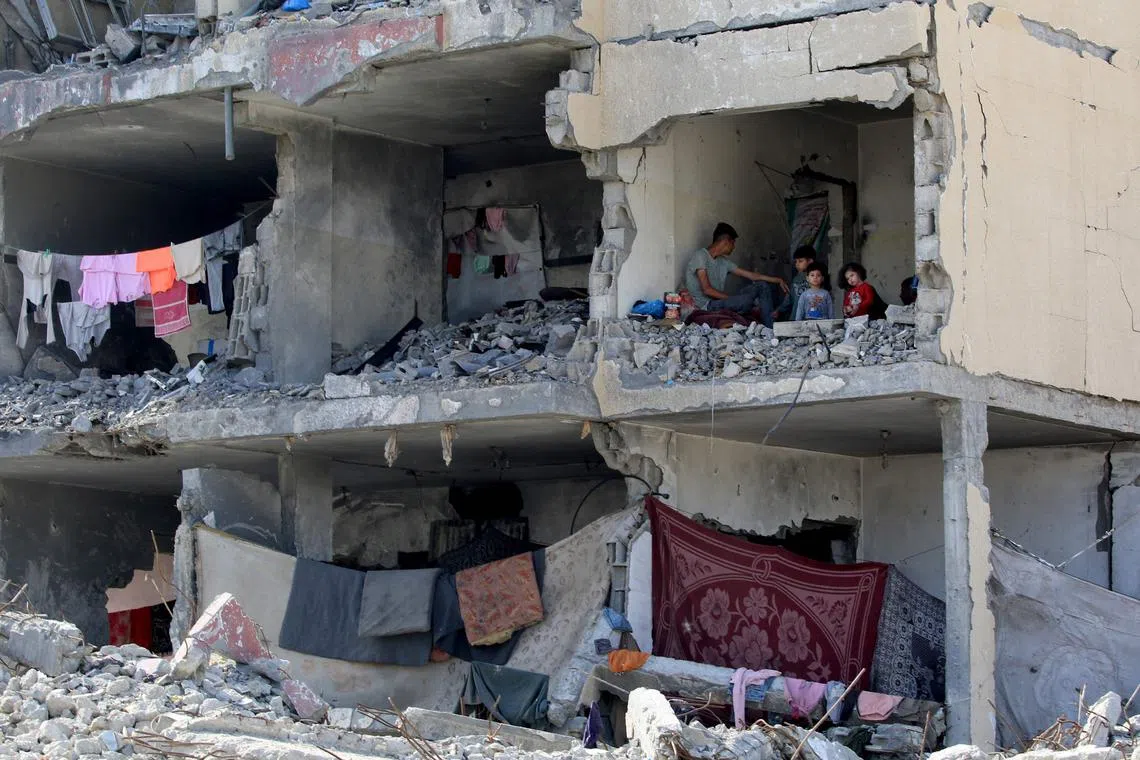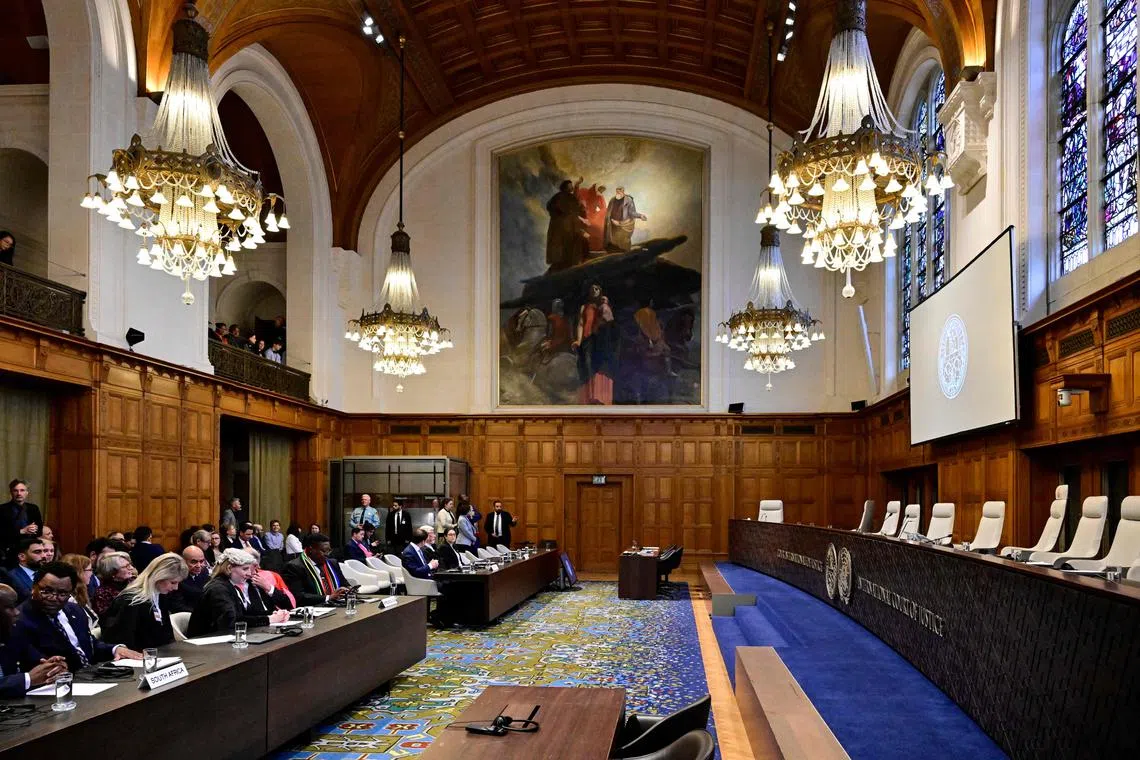World Court orders Israel to ‘immediately halt’ offensive in southern Gaza city of Rafah
Sign up now: Get ST's newsletters delivered to your inbox

A residential building damaged by an Israeli air strike in Rafah in southern Gaza on May 22.
PHOTO: AFP
Follow topic:
CAIRO – The top United Nations court on May 24 ordered Israel to halt military operations in the besieged city of Rafah in southern Gaza, a landmark ruling likely to increase the mounting international pressure on Israel.
Israel must “immediately halt its military offensive, and any other action in the Rafah governorate, which may inflict on the Palestinian group in Gaza conditions of life that could bring about its physical destruction in whole or in part”, said the International Court of Justice (ICJ), also known as the World Court.
It also ordered Israel to keep open the Rafah crossing into Gaza for the “unhindered” provision of humanitarian aid, and called for the immediate release of hostages taken by Hamas in its Oct 7 attack on Israel
“The court finds it deeply troubling that many of these hostages remain in captivity, and reiterates its call for their immediate and unconditional release,” it said.
Israel’s far-right Finance Minister Bezalel Smotrich responded to the ruling on social media platform X, saying “history will judge those who stand today alongside the Nazis of Hamas Daesh”, referring to militant group ISIS.
The Palestinian Authority, on the other hand, welcomed the decision, saying it represents an international consensus to end the war in Gaza.
ICJ rulings are legally binding, but the court has no concrete means to enforce them. For example, it ordered Russia to halt its invasion of Ukraine, but to no avail.
South Africa brought the case before the ICJ in 2023, alleging that Israel’s Gaza offensive breached the 1948 UN Genocide Convention, a charge strongly denied by Israel.
In a ruling on Jan 26 that made headlines worldwide, the ICJ ordered Israel to do everything it could to prevent acts of genocide during its military operation in Gaza.
But South Africa has since returned several times to the ICJ, arguing that the dire humanitarian situation in Gaza compels the court to issue further fresh emergency measures.
The court did so in March, ordering new measures compelling Israel to ensure the “unhindered provision at scale” of humanitarian aid.
The ICJ said on May 24 that the situation in Gaza has instead deteriorated since then.
The order was adopted by a panel of 15 judges from around the world in a 13-2 vote, opposed only by judges from Uganda and from Israel itself.

The International Court of Justice on May 24 ordered Israel to halt military operations in the besieged city of Rafah in southern Gaza.
PHOTO: AFP
Israel has repeatedly dismissed the case as baseless, arguing that its operations in Gaza are in self-defence and targeted at Hamas militants who attacked Israel on Oct 7.
It retorted in hearings leading up to the ruling that South Africa’s case was an “obscene exploitation of the most sacred convention”, and the picture Pretoria painted to the court was “completely divorced from the facts and circumstances”.
“It makes a mockery of the heinous charge of genocide,” said Israel’s top lawyer Gilad Noam.
“Calling something a genocide, again and again, does not make it genocide. Repeating a lie does not make it true,” he added.
Israel also said it was “acutely aware” of the suffering of civilians in Gaza, and that it has made “extensive efforts” to increase the flow of humanitarian aid.
The May 24 ruling came as Israeli forces stepped up military strikes on Gaza, with heavy fighting reported in Jabalia in the north and tanks pushing farther into Rafah.
Medics said at least five Palestinians were killed when houses were hit in Jabalia, and more were believed to be trapped under rubble, but that the area could not be reached due to the intensity of the bombardment.
In Rafah, bordering Egypt, where an escalating Israeli assault has sent hundreds of thousands of people fleeing from what was one of the few remaining places of refuge, residents reported explosions and smoke rising in the distance as tanks advanced farther into the eastern district of Jneina.
“We’re not smashing into Rafah. We’re operating carefully and precisely,” said military spokesman Daniel Hagari.
Israel launched its assault on Gaza following a Hamas-led attack on southern Israeli communities on Oct 7
Since then, Israel’s incursion has killed over 35,000 people, according to the Gaza health authorities.
The Israeli military said it recovered the bodies of three hostages
It said the bodies of Mr Hanan Yablonka, Mr Michel Nisenbaum and Mr Orion Hernandez Radoux were recovered overnight in a joint operation by the army and the intelligence services in Jabalia.
Israel says its twin goals in Gaza are bringing back the remaining hostages and destroying Hamas.
“We will not stop fighting for their freedom,” said Rear-Admiral Hagari in a televised statement announcing the recovery of the three bodies. “Every decent country would do the same.”
Fighting in the north
Israel has said its forces had already cleared Jabalia, the largest of Gaza’s eight historic refugee camps, months earlier in the war. But it returned there in May, saying it needed to prevent Islamist militants from regrouping, and the area has seen intense fighting in recent weeks.
Residents said on May 24 that tanks destroyed the local market, and bulldozers continued to raze shops and property in Jabalia’s narrow alleys. Hamas’ armed wing said its fighters engaged three tanks there.
Dr Mohammad Saleh, acting director of Al-Awda hospital, said the hospital – one of only two still functioning in northern Gaza – has been under Israeli siege for five consecutive days.
“Soldiers are present in the hospital’s courtyard and in nearby houses,” he said, adding that there was “continuous gunfire and shelling” towards it.
“We hear nothing but the sound of explosions and gunfire,” said Mr Mahmud al-Sharif, 31, in the Jabalia refugee camp.
A local source reported helicopters firing at the camp and renewed artillery shelling in the area.
The Israeli military reported “targeted raids” in the Jabalia area and ongoing “activity” in central Gaza. REUTERS, AFP

